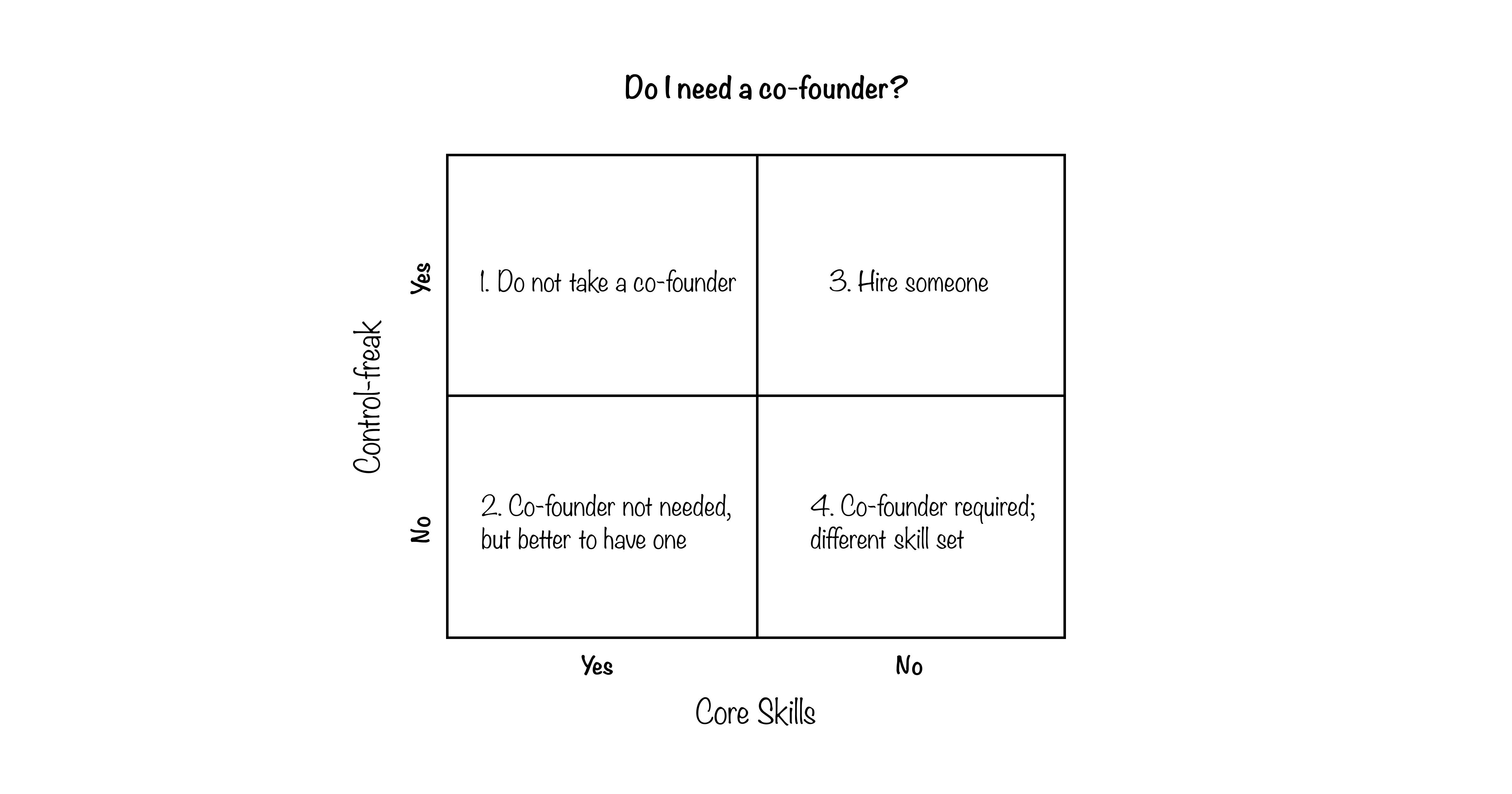Building your early team: Do you need a co-founder? (Part 1)
 The Run Digital
The Run Digital
While there isn't any fixed rule on these things, I was introduced to a few metrics from the Future Founders' Conference by Ankur Warikoo last year, and I genuinely liked this 2x2 matrix which I am going to share with you in this article. There could be a couple more elements related to it, nevertheless, it's an excellent starting point.
Even if investors do not favor solo founders, 90 percent of startups that raised $10 million or more had either one or two founders, with 57 percent being solo founders and 33 percent having two founders. Although the evidence favors both, why is it essential to have a co-founder?
Firstly, the journey is emotionally, mentally, and physically challenging, and it is great to have someone to share the load with. One of the other points could be you lack all or some of the skills necessary to run the venture. Lastly, risk management. What if something were to happen to the only founder?
However, most investors are hypothesis-driven and I hear this over and over again that getting an early/angel investment is like marriage. Mostly, an angel investor invests if he or she is enamored with your idea, believes in you (including your capacity to execute), and sees a substantial market opportunity. Consequently, based on the statistic (90% of startups having one or two founders), it could be argued that you still stand a chance to be a solo founder and take the helm. Let's delve deeper to determine whether you need a co-founder or not using the 2x2 matrix provided below, but first, let's understand what a core skill is and what it means to be a "control freak."
What does "having core skills" mean?
Having a core skill means whether you have the skill that is required to run the venture. For instance, a core skill of a marketing agency could be knowing digital marketing, for a retail store it would be knowing sales and marketing; for a web agency it would be knowing how to build websites, etc. This means that the skill that is necessary for the daily operation of the business is a core skill. Managing finances may be a daily activity of a firm, but this does not necessitate a CFO co-founder, at least not in the early stages of your venture.
What does it mean to be a control freak?
In this context, a "control freak" is someone whose actions show that they have a strong need to control people or situations in their day-to-day business activities.
Are you a control freak? Be true to yourself here. Do you get angry when things do not go YOUR way, even though the primary objective is achieved? If you answered yes, you are a control freak.
If you are not a control freak and do not want things to be accomplished with a great deal of clarity, you can hire smart people and share an overall vision with them. In this way, the person would be able to figure out how to do things in the way that seems best to them. This could all be accomplished under your supervision, and it is totally alright.
Anyway, let's get started with the metric:
Firstly, if you're a control freak and also have the core skill required to run the business, do not take a co-founder. As simple as that. Your firm would perform better if it had a co-founder with a different skill set; yet, since you're a control freak, it's best not to get a co-founder because it would only lead to a long-term dispute(mostly if understanding does not develop).
Secondly, you're not obliged to get a co-founder if you possess the core skill and aren't a control freak. Yet, having someone with a different, yet complementary skill set and also someone who can suggest different ideas is a win-win!
I want to break down a little bit here what I mean by having different ideas. I'm going to use the same example as Ankur Warikoo here. For example, you and your partner (the co-founder) are attempting to solve a business case study based on a few pieces of data. If you both provide different solutions to the same problem, it means your venture has a higher success rate as you can both recommend distinct approaches to solve a certain problem. On the flip side, if you both come up with the same solution, it does not bring anything extra to your business, right? It simply means you both have the same analytical ability (could be due to belonging to the same academic background, culture, etc.), but clearly this isn't a positive sign. Having distinct ideas to solve the same problem doesn't create conflict, it only creates new opportunities for the venture which is great.
Thirdly, if you lack the core skill that is required to run the startup and, at the same time, you're a control freak, do not get a co-founder. Instead, hire someone who has the core skill that is needed for the startup and then provide him/her with guidance on how to get things done. It could be harder (not impossible if enough traction could be shown) to raise funds for these types of startups; however, in this context (getting or not getting a co-founder), it is a better choice. With time and if required, however, you can also make the person a co-founder.
Lastly, if you lack the fundamental skill and are not a control freak, i.e., if you merely have a startup concept, you should seek out a co-founder who shares the same values as you do. He/she believes in what you believe and is morally somewhat identical to you. Most importantly, get someone who has a different skill set than you but that skill is somewhat necessary/related to your business.
I want to elaborate on values/morale a bit here because, in the next post, I'll be discussing "Choosing a co-founder for your startup," and over there, value is one of the three parts that are essential in deciding whom to choose as a co-founder for your winning business. Also, value is one of the most important things that can make or break your business, especially in the long run, because if you and your partner are not on the same page and create conflict every now and then, chances are that your startup will suffer due to this. As human beings, we all have a certain tolerance level, and having different values could cause a disaster.
Let's learn about value with an example. If you find it easy to get things done using bribes, but your partner does not, chances are that this practice will eventually cause a serious problem in the long run, as you do not have the same moral compass or values. Therefore, it is essential that you and your prospective co-founder have similar values.
Anything to add?
To conclude, while this particular metric might come in handy to give a gut feeling on whether getting a co-founder is necessary for you or not. In the end, I believe, it is ultimately dependent on your short-term and long-term goals plus your access to funds. It is better not to be a solo founder unless you have enough experience, are strongly dedicated, know what you want, and have the hunger to get where you want to be!
Subscribe to my newsletter
Read articles from The Run Digital directly inside your inbox. Subscribe to the newsletter, and don't miss out.
Written by

The Run Digital
The Run Digital
Based in Dhaka, We are a Creative SaaS & Web Development Company with a specialty in eCommerce. From technical writing to business, we do it all.